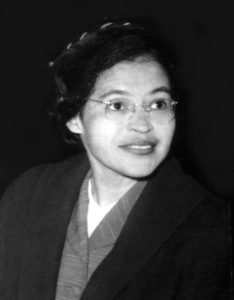Today’s women are not the first to take a public stand against sexual assault and harassment
The Wall Street Journal, August 23, 2018

Rosa Parks in 1955 PHOTO: GETTY IMAGES
Since it began making headlines last year, the #MeToo movement has expanded into a global rallying cry. The campaign has many facets, but its core message is clear: Women who are victims of sexual harassment and assault still face too many obstacles in their quest for justice.
How much harder it was for women in earlier eras is illustrated perfectly by Emperor Constantine’s 326 edict on rape and abduction. While condemning both, the law assumed that all rape victims deserved punishment for their failure to resist more forcefully. The best outcome for the victim was disinheritance from her parents’ estate; the worst, death by burning.
In the Middle Ages, a rape victim was more likely to be blamed than believed, unless she suffered death or dismemberment in the attack. That makes the case of the Englishwoman Isabella Plomet all the more remarkable. In 1292, Plomet went to her doctor Ralph de Worgan to be treated for a leg problem. He made her drink a sleeping drug and then proceeded to rape her while she was unconscious.
It’s likely that Worgan, a respected pillar of local society, had relied for years on the silence of his victims. But Plomet’s eloquence in court undid him: He was found guilty and fined. The case was a landmark in medieval law, broadening the definition of rape to include nonconsent through intoxication.
But prejudice against the victims of sexual assault was slow to change. In Catholic Europe, notions of family honor and female reputation usually meant that victims had to marry their rapists or be classed as ruined. This was the origin of the most famous case of the 17th century. In 1611, Artemisia Gentileschi and her father Orazio brought a suit in a Roman court against her art teacher, Agostino Tassi, for rape.
Although Tassi had a previous criminal record, as a “dishonored” woman it was Gentileschi who had to submit to torture to prove that she was telling the truth. She endured an eight-month trial to see Tassi convicted and temporarily banished from Rome. “Cleared” by her legal victory, Gentileschi refused to let the attack define her or determine the rest of her life. She is now regarded as one of the greatest artists of the Baroque era.
One class of victims who had no voice and no legal recourse were free and enslaved black women in pre-Civil War America. Their stories make grim reading. In 1855, Celia, an 18-year-old slave in Missouri, killed her master when he attempted to rape her. At her trial she insisted—through her lawyers, since she was barred from testifying—that the right to self-defense extended to all women. The court disagreed, and Celia was executed—but not before making a successful prison break and almost escaping.
Change was still far off in 1931, when the 18-year-old Rosa Parks, working as a housekeeper, was pounced on by her white employer. As she later recalled, “He offered me a drink of whiskey, which I promptly and vehemently refused. He moved nearer to me and put his hand on my waist.” She managed to fight him off, and in a larger sense Parks never stopped fighting. She became a criminal investigator for the NAACP, helping black victims of white sexual assault to press charges.
Rosa Parks is often referred to as the “first lady of civil rights,” in recognition of her famous protest on a segregated bus in Montgomery, Alabama in 1955. She should also be remembered as one of the unsung heroines in the long prehistory of #MeToo.







